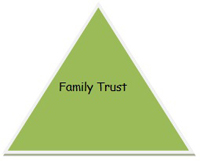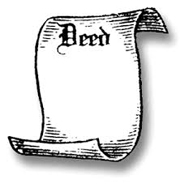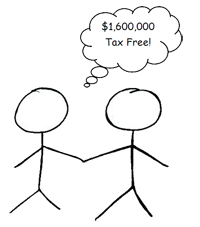How to Setup your Family Trust in Canada
Allan Madan, CPA, CA
Many Canadian business owners are advised to form a Family Trust in Canada considering its many advantages, in particular saving taxes. However, very few business owners are aware of the steps required to actually form a family trust. This article will cover: (A) How a family trust operates and (B) The steps needed to establish a Family Trust in Canada.
When is a Family Trust Created?
In order for a Family Trust in Canada to be valid, three conditions must fully be met:
- There was intention by the settlor to create the trust;
- The beneficiaries of the trust are clearly identified; and
- The property which is transferred by the settlor to the trustee to establish the trust is clearly identified.
Although the above conditions seem relatively simple, this alone is not sufficient. The actions by the settlor and trustee subsequent to the creation of the family trust will play a strong factor in determining if the trust is valid.
Determining the individuals required for your Family Trust in Canada:
Family trusts in Canada primarily consist of three key individual: (A) The settler, (B) Trustees and (C) Beneficiaries.
 |
 |
 |
 |
||
A family trust with only one individual playing all three roles would not be considered a valid trust. It’s important to consult with your legal counsel or accountant when setting up a family trust to appoint a trustee who is a third party (distinct from the beneficiaries and settler) in order to avoid a conflict of interest.
Settler: The settler creates the family trust and specifies the rules that the trustees must abide by when governing the trust. The settler will also specify the beneficiaries of the income and capital distributed by trust are and the circumstances under which the beneficiaries will be entitled to that income or capital. The settler initially contributes property to the family trust in order to establish trust in compliance with trust law and is the only person allowed to contribute any property to the trust.
Trustee: The trustee is the individual who will administers the property placed in the trust. This includes distributing income or gains from the property to the beneficiaries in accordance with the rules setup by the settler. There may be more than one trustee in a family trust.
The trustee is responsible for the beneficiaries and is required to always act ethically and in the interest of the beneficiaries. Trustees are entitled to receive fees for performing their duties.
Beneficiary: Income beneficiaries are entitled to receive income from the trust and capital beneficiaries are entitled to receive capital from the trust, either during its existence or when the trust is wound up. Capital beneficiaries may also be income beneficiaries.
The Steps to Setting up Your Family Trust in Canada
The steps involved in setting up a family trust are not complicated. Your accountant will draft the family trust deed and will require the following information from you:

Name of the Family Trust: A Family Trust name is not registered legally with the CRA or Ministry of Government of Services. The Family Trust name will consist usually of your last name and the term “Family Trust”, for example the “Smith Family Trust”.
Settler Name: A Family Trust requires a settler as detailed above. Your accountant will require the full name and address of the settler along with the settler’s relation to you (if any). It’s common for the settler to be a grandparent, or close relative. It’s important that the full legal name of the settler is spelled out in the family trust deed and not his/her nick name or short name.
Trustee: The Family Trust deed will require the full name and address of the trustees who will be administering the family trust. Upon signing the family trust deed, it’s a best practice to have a witness.
Date: The Family Trust deed will require a ‘creation date.’ This is the dated when the family trust is created or formed.
How Can a Family Trust in Canada Save Taxes
A family trust is an excellent mechanism to split income with family members, who are usually the beneficiaries of the family trust. Income splitting means transferring income from a high income earner to a low income earner. Low income earners pay less tax. Examples of income splitting through a trust include:
- Profits from real estate investments
- Profits from a business
- Profits from stocks and bonds
A family trust can also be used to multiply the capital gains exemption on the sale of private company shares. In Canada, the first $800,000 of profit on the sale of private company shares can be exempted from tax by using the capital gains exemption. This exemption is available to each beneficiary of a family trust, if structured properly. Thus, sellers of a business are motivated to add as many beneficiaries (usually family members) as possible to a family trust in order to maximize (or multiply) the capital gains exemption. See the diagram below:
 |
 |
 |
| 1 Beneficiary = $800,000 Exemption | 2 Beneficiaries = $1,600,000 Exemption | 3 Beneficiaries = $2,400,000 Exemption |
Conclusion
As you can see the setup of a family trust in Canada is not very complicated but still requires a professional tax accountant to ensure it’s created in compliance with applicable the trust laws. To better understand the common situations where you can use a family trust to help save taxes please visit the following pages below:
- Transferring your Business to a Family Member in Canada
- Estate Planning Canada and Succession Planning Services
- Should I setup a Family Trust in Canada?
To learn more tax saving tips please visit 20 Tax Saving Tips
Disclaimer
The information provided on this page is intended to provide general information. The information does not take into account your personal situation and is not intended to be used without consultation from accounting and financial professionals. Allan Madan and Madan Chartered Accountant will not be held liable for any problems that arise from the usage of the information provided on this page.




How much does it take to create a trust for real estate purposes. Is there any ongoing maintenance costs (eg filing , etc)
Since it’s harder to acquire investment properties in corporate name, I figured creating trust might be better option. Thank you
Hi Kash, our fee is $1,500 to setup a Family Trust. Yearly filing fees (trust return) start from $500. Disbursements and taxes are extra.
Hi, I am interested in setting up a trust for my family fo mainlyr asset protection reasons. What details would I need to provide in order to set up this trust?
Hi Peter,
To start with, I will need the names and addresses of the trustees, the beneficiaries and the settler. I would also like to know the details of the assets you are trying to protect.
Do we have to register a trust? if yes with whom?
Hi Naimesh,
Yes, a family trust should obtain a Trust Number from the CRA and file a T3 Trust Return annually.
Hello,
Can the assets of a trust be simply cash? That is, a situation where cash is paid in by the settlor and cash is paid out to the beneficiaries from time to time?
Thank you
Hi Adetokunbo,
Yes, this is allowable. However, I don’t see the purpose of placing cash in a Trust that does not generate any income for distribution to beneficiaries.
Can a private citizen set up a trust, or, is a lawyer or cpa necessary?
You should hire a lawyer or CPA. It’s complicated.
Is this information still valid in 2025? with all the changes the Canadian Government has made in the last few years regarding trust and trust income.
Hi Shelley,
Yes, you can still use a Family Trust to take advantage of the lifetime capital gains exemption and multiply it by the number of beneficiaries. The major change has to do with paying dividends from a family business to beneficiaries of a trust. The dividends are subject to the TOSI rules and taxed at 53%.
Hi In your professional opinion is it better to setup a Testamentary Trust or a Family Trust in Canada? If portfolio funds are in a trust paying out a portion of dividends to beneficiaries and holding the rest within the portfolio for future growth? From a tax perspective? I don’t want to have the beneficiaries paying the taxes owed on the portfolio funds, only on the funds they receive. I’ve talked to my accountant and also a lawyer and both have no particular answer. Would be interested in hearing your opinion.